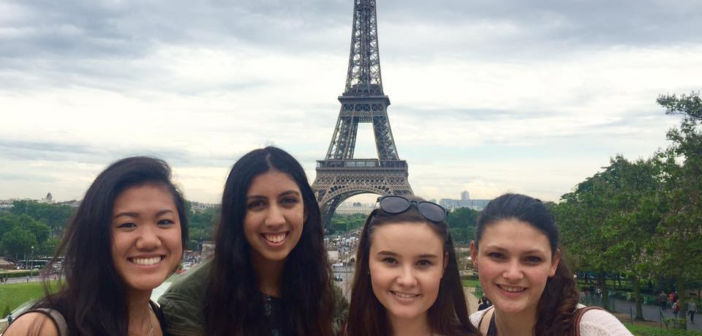On Bastille Day this past summer, Noelle Jacobsen, ’18, and fellow students in the Lehigh in Paris program were watching fireworks at the Eiffel Tower when she began to receive texts asking if she was all right.
At the time, Jacobsen didn’t know about the terror attack involving a truck that drove into a crowd of people, killing more than 100 in Nice. Once she did, Jacobsen said she was nervous and that, rather than going out to celebrate the holiday, the group stayed in that night.
“It was sad that on the day of celebrating French liberty, they had to get attacked again on their own soil,” Jacobsen said.
Although there have been terrorist attacks all over the world, Katie Radande, the director of Study Abroad, said that overall safety is important to the Study Abroad Office and that students should not let the fear of unpredictable events hinder their chance of traveling.
Radande said approximately 40 percent of Lehigh students study abroad before they graduate.
“We do put a lot of time at Lehigh in helping students have positive and safe experiences abroad,” Radande said.
There are multiple groups concerned with study abroad safety, including International SOS and International Travel Advisory Committee, ITAC. The International SOS is Lehigh’s 24-hour emergency response group. Radande said the nurses, doctors and security specialists are helpful in answering medical and security questions and concerns.
Before even going abroad, students are required to attend meetings with a study abroad adviser.
“We have three study abroad advisers and they work one-on-one with students to help with their personal interests and academic and career goals,” Radande said.
There is an adviser for each individual college. Students learn policies and information at meetings as well as safety tips, such as learning the equivalent phone number for 911.
She said that all the resources are there for the student. It is the student’s responsibility to ask questions and prepare accordingly.
World events, although not as frequent as other problems when studying abroad, have become a factor for some students in deciding to travel.
Caroline Raney, ’18, who attended the Lehigh in Belgium marketing program this past May, said that only nine of the 30 students who were signed up to go actually went due to the bombings in Brussels. However, she said she never felt scared when she arrived in Belgium.
“I traveled through Brussels every weekend of the program and never had any issues,” Raney said. “There was no sign that anything has happened, really except the increase in security.”
Raney said students should go abroad if that is something they want to try.
During the Lehigh in Paris program, Jacobsen said she was aware of some of the events happening in the world before she went but she did not want to let the opportunity to study abroad be hindered by fear.
“I believe that there are so many wonderful places that people should go out and explore in the world so you should not have to trade in your freedom just for security,” Jacobsen said. “You can’t live in a bubble all your life.”
Sage Chasen, ‘19, who was also part of the Lehigh in Paris trip, almost went to visit Nice that weekend when he decided at the very last minute to change his plans for Bastille Day.
“I felt like Paris would have been the place to be,” Chasen said. “So I stayed back and I got a call later at night and my mom was hysterically crying because she thought I was in Nice.”
Chasen said that they did not let the attack in Nice affect the mood of the trip. It was his first time out of the country and he didn’t want to let the attacks stop him from getting the most out of his experience.
Shortly after the attack in Nice, Radande said the Study Abroad office contacted professor John Savage, the faculty leader, to report back if everyone is safe.
In addition to safe study abroad trips, Lehigh does have a policy that prohibits students from studying in countries classified as travel warning locations by the U.S. government Radande said. A list of travel warning countries can be found online but some locations include Israel, Kenya and Mexico.
Even though this policy is in place, Radande said that there are exceptions to the rule. One of these exceptions is for faculty members who want to bring a group of students to a travel warning location.
However, if a Lehigh student wants to go to a travel warning country for a whole semester by his or herself, then that student is required to take a leave of absence from Lehigh and would have to transfer credits they earn abroad when returning to and re-enrolling at Lehigh, Radande said.
“Study abroad is really part of Lehigh’s experience,” Radande said. “There’s a lot of opportunity so I really think students should consider it. People always say studying abroad is life changing and it really is. It can you help build a resume, explore the world, learn something new about yourself and other people.”






Comment policy
Comments posted to The Brown and White website are reviewed by a moderator before being approved. Incendiary speech or harassing language, including comments targeted at individuals, may be deemed unacceptable and not published. Spam and other soliciting will also be declined.
The Brown and White also reserves the right to not publish entirely anonymous comments.
2 Comments
Pingback: Terror assaults, international local weather influence research overseas choices | All About Zika Virus
Every traveler should register their trip at step.state.gov prior to departure. Emergency contacts can also ‘follow’ country specific updates by registering. This provides the traveler with emergency alerts when their safety is at risk and provides advice from your United States consulate on best actions. ALSO – every traveler should read Overseas Security Advisory Crime Reports by Country. Just do an Internet search – OSAC Crime Report France or Brussells 2016. Safety is not an accident. Depart Smart . Org provides a free travel safety checklist to help you depart smart. Safe Journeys!